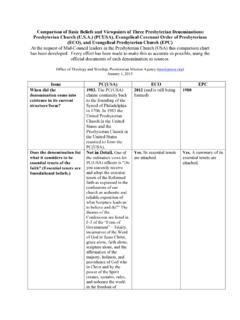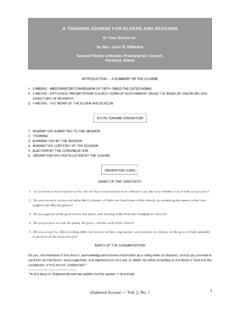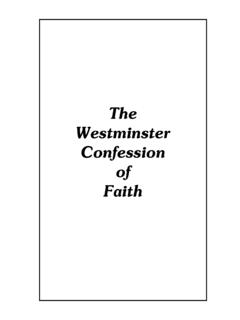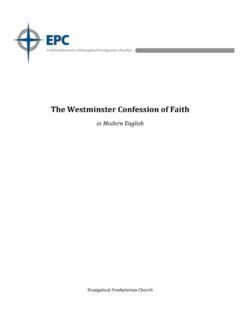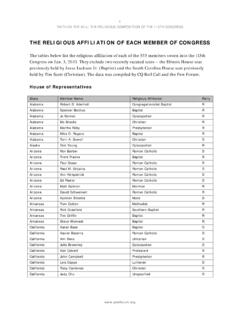Transcription of Chapter 1: Introduction to Theology
1 Theology 1: Revelation and Theological Method Western Reformed Seminary ( ) John A. Battle, Chapter 1 Introduction TO Theology Definition of Theology qeo/v theos, God lo/gov logos, word, study, science thus, the science or study of God Augustine: Theology is rational discussion respecting the deity Charles Hodge: science of the facts of divine revelation Louis Berkhof: the systematized knowledge of God in his various relations to the universe.. Theology is the effect which the divine revelation, embodied in Scripture, produces in the sphere of systematic thought. Theology is the fruit of the reflection of the church on the truth revealed in the Word of God.
2 Some questions regarding the definition of Theology : 1) Is Theology a science? science being understood as the study of reality based on observation, theorizing, and experimentation Science bases its knowledge on the ability of man to perform these tasks objectively ; it does not deal with non-physical or spiritual reality; it does not accept a prior revelation from God as the basis of knowledge. 2) What part does reason play in Theology ? Christian Theology bases its findings on revealed material ( , the Bible); it pursues its object by both scientific (inductive study) and non-scientific methods (prayer, Christian experience, etc.
3 3) Does Theology yield absolute truth? Can infallible divine revelation plus fallible human reason yield absolute truth? 4) Must the results of Theology be refined from time to time? While the original revelation of God is complete, our understanding of it develops over time, with greater study and experience. Famous phrase: Reformed, but always reforming Sources of Theology Theologians have found several sources from which to develop their ideas of God: Reason (defined narrowly, as logical deduction from stated premises, or broadly, including also one s feelings, intuition, experience) This position says that one can find his way to God by this own thought, reasoning, contemplation, etc.
4 An example would be St. Anselm, who developed the ontological argument for the existence of God. Another group would seek confirmation for God and his attributes in human experience, especially religious experience (cf. neo-orthodoxy). church authority Many groups (such as the Roman Catholic church ) teach that God reveals his truth to the church in some collective way, or directly to the leaders of the church . After some time, these teachings become even stronger by the force of tradition. General revelation Some say that much of God s person and character is revealed in nature, so that, by contemplating nature, man is able to have a true knowledge of God.
5 The evidentialist apologists of England provide an example. Special revelation The Bible claims to be a direct revelation to man from God. Christian belief in the Bible requires us to find and systematize the teachings found there. Postmodern Theology s sources of Theology Postmodern evangelical Theology sees three sources for Theology : special revelation (Scripture), tradition, and the culture. Such is Theology is worked out by Stanley J. Grenz in his Theology for the Community of God (2000). Dogmatic approach to Theology One way to study Theology is to study the various creeds of the churches.
6 This is called the dogmatic approach. Theological study and conflict in the church have produced a series of creeds, which reflect the growth in understanding of the church in particular areas. Creeds are the fruit of reflection by the church (not just individuals) on the truths revealed in the Bible. They are officially adopted by a competent ecclesiastical body, and have authority in the circle wherein they are recognized. This sets them apart from statements by individuals. For an excellent collection and explanation of these creeds, see Philip Schaff, Creeds of Christendom (3 vol.)
7 James Dennison has begun a three-volume series on the Reformed creeds in particular; so far the first volume has appeared: Reformed Confessions of the 16th and 17th Centuries in English Translation: 1523-1552 (2008). Creeds of the ancient church Apostles Creed. start in second century; present form in sixth century Nicene Creed. formulated in 325 at the council at Nicea; emphasizes deity and eternity of God the Son; Constantinopolitan form of the Nicene Creed (381) added person and work of Holy Spirit; Latin form added filioque (Holy Spirit proceeds from the Father and the Son) at council of Toledo (589) Athanasian Creed.
8 Written over fifth to eighth centuries, named after Athanasius, bishop of Alexandria (328-373) Chalcedonian Creed. (431); most precise for the person of Christ; two natures, without mixture, change, division, or separation Creeds of the Roman Catholic church (accepts all ancient creeds, and the first eight ecumenical councils) Canons and Decrees of the Council of Trent. (1545-63); called to counteract against Protestantism Creed of Pius IV, Profession of Faith of Trent . papal bull of Pius IV (1564); all teachers, ecclesiastics, converts from Protestantism had to subscribe to it Roman Catechism.
9 Produced by Pope Pius V (1566); explains and enforces Canons of Trent Decrees of the Vatican Council. (1869-70); strengthened position of papacy, infallibility of the pope; confirmed doctrine of Mary s immaculate conception (1854) Decrees of Vatican II. (1963-65); assumption of Mary; liberalized church teaching in many areas Roman Catholic Catechism. (1994); large work, incorporates liberalized teachings of Vatican II, yet still asserts traditional distinctives Creeds of the Greek church (Division from the western church , 1054; recognizes the first seven ecumenical councils) Orthodox Confession of the Catholic and Apostolic Greek church .
10 (1643) Decrees of the Synod of Jerusalem (or Confession of Dositheus). (1672) Longer Catechism of Philaret. (Russian catechism; 1839) Creeds of the Lutheran church (accept Apostles , Nicene, Athanasian, Chalcedonian) Larger and Smaller Catechisms. (by Luther; 1529) Augsburg Confession. (by Luther and Melanchthon; 1530; oldest Protestant confession, the only universally accepted Lutheran standard) Apology of the Augsburg Confession. (by Melanchthon; 1537) Articles of Smachald. (by Luther; 1537) Formula of Concord. (1577; hardened Lutheran positions on grace and free will and on the Lord s Supper) Creeds of Reformed Churches (Reformed churches accept same ancient creeds as the Lutheran churches.)


